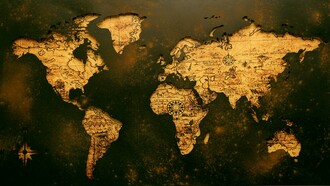In the latest issue of the International Monetary Fund's (IMF) Finance and Development magazine, Director General Kristalina Georgieva quotes Leonardo da Vinci:
Knowing is not enough; we must apply. Being willing is not enough; we must do.
(Leonardo Da Vinci)
This is exactly what matters in the debate on climate change and biodiversity. We know what must be done, but it is not happening; partly because we do not want to, partly because we cannot, partly because we do not know how.
Climate science is difficult. Scientists have been studying the various phenomena that can have an impact on climate change, but how exactly this will happen, when and with what precise consequences is difficult to predict. For decades, the reports of the Intergovernmental Panel on Climate Change (IPCC) have been gems of expertise and a source of valuable knowledge that simultaneously lead to more understanding and more questions. But scientists do not make policy. That job is for politicians who can use the data to make hard decisions. But do they? To a sufficient extent? The answer to that question is a clear no. For more than 30 years, the IPCC has been hammering away at the same nail, but not much is moving. We are heading for a series of disasters that are already clearly visible: forest fires, floods, tornadoes, a major extinction... The European Union laid out Fit for 55, in what is called an ambitious climate plan. ‘Unfit and unfair’ replies the European Environmental Bureau. ‘Net zero' and 'no-net-loss' say the governments, but the social movements label this as 'greenwashing.'
Social movements have been keeping the fire of environmental activism burning for decades. Since the first UN Conference on Development and Environment in 1972, thousands of movements have been active in raising awareness of the impending crisis and the need to change our economic and social system. Across the world, this has led to the emergence of political parties that suggest we should 'live differently.' But how? And how do you convince people? And will this be enough?
I'm not an expert myself and I usually have only questions for scientists and environmental activists. And like many citizens, I think, after a few decades one wonders what we are actually doing. As we know better just how close the crisis is and what has to be done about it, the horizon of practical and concrete steps gradually disappears. We know that things can and must change, but we don't know how to get there.
Here are some examples. Let me start with the de-growth movement, which arose after the publication of the 1972 Club of Rome report. This report stated that some raw materials, in the event of unlimited economic growth, could be depleted. The World Bank immediately turned this reasoning around. For the Bank, it is not about growing less to protect the environment, but about protecting the environment in such a way that growth remains possible.
That contradiction still exists. Even the IPCC now says that there is no more room for growth, but the World Bank and the IMF continue to argue for 'sustainable growth.' With a growth rate of around 3%, the global economy can double in less than 25 years. Even a child can see that in this way, you quickly reach the planetary boundaries, certainly if the population growth continues as well. Growth would therefore no longer be possible and the current economic system is outdated. But how do you deal with this in a world in which one billion people are extremely poor and the vast majority of those who are relatively well-off do not want to make any sacrifices?
For environmental activists, the first step was indeed to limit growth, which is what the word de-growth says. But as it became clear how difficult that was, it was changed to a different economic system that does not have growth as an objective. That seems acceptable, but it says nothing about what exactly that other economic system is. And above all it says nothing about how we can achieve it. In recent years, a lot has been written about new 'commons' initiatives, and about a new 'social and solidarity economy.' Unfortunately, in the vast majority of cases, these are local initiatives for food security, barter, local currencies or aid for the poor. This can be very useful and positive, but I would not dare to call it a 'different' system, certainly not as long as big industry keeps on running and polluting with a very limited degree of recycling. There will be no structural change. The circular economy offers more opportunities for real change as soon as more can be recycled, but the road is still long.
A second problem concerns extractivism and raw materials. Last year there was a lot of fuss about a film made by Michael Moore that showed how many of the 'green proposals' are not solutions at all. In his film, Moore shows how many of the green stories, like those about wind and solar energy or about biomass, are not true. Moreover, he shows that many environmental movements are financed by foundations of the big polluters and their multinationals. Nothing new under the sun, but it is apparently not allowed to be said. Not only does the production of windmills and solar panels require a lot of raw materials, they also have a limited shelf life and therefore produce huge mountains of waste which can only be partially recycled.
The raw materials problem is very acute. According to a World Bank study, it will not be so easy to switch completely to clean energy. If we want to achieve the objective of a maximum temperature increase of 2°C, a total of more than three billion tons of minerals will be needed for the production of clean energy by 2050. The Economist already speaks of inevitable bottlenecks. The production of graphite, lithium and cobalt must increase by 450% compared to 2018.
Other minerals that are increasing less spectacularly but still need to be mined are iron, copper, aluminium, chromium, lead, manganese, molybdenum, nickel, silver, titanium, zinc and vanadium. The exploitation of these raw materials can have serious ecological and social consequences, therefore the popularity of 'clean' energy may rapidly decline. The protest that already exists against extractivism in, for example, Latin America, speaks volumes about the dilemmas that await us. You cannot want clean energy and at the same time reject mining. Or to put it another way, you can reject mining, but at the same time you have to be willing to give up available energy, as well as mobile phones, laptops, cars, trains and planes. It's a ripping choice that, I think, will not be made. The demand for energy keeps rising all over the world, which is normal with a growing and poor population.
A great deal of attention will have to be paid to the possibilities of recycling and reusing raw materials, but that too is not for the short term. Waste management will be a hugely difficult task. We keep dreaming of green and blue hydrogen, capture and storage of CO2 as well as nuclear fusion, but these are technologies that are not yet sufficiently developed and, therefore, do not offer a solution in the short term.
This brings me to the last and most difficult point which shows that we are at a loss. For decades we have been told what we should and should not do: eat less meat, drive fewer cars, stop travelling and flying, save energy, don't use plastic bags, etc. There are two problems with this. First, none of this will help if, in the meantime, large chemical and mining companies can continue to pollute the major rivers, if the seas continue to be fished empty and if Bezos and Musk continue to develop their plans for space tourism. Even if we all stopped emitting CO2, we are still heading for a planetary disaster if the military apparatus of various countries continues to function as it does now. Who will do something about it? Some had thought that during the COVID-19 lockdowns, pollution would drop sharply due to a decline in economic activity. The reality was very disappointing. According to NASA, there was a noticeable drop in nitrogen dioxide in the air, but not all pollutants were taken out of circulation and in fact the air was not cleaner at all.
Second, people will never voluntarily drastically reduce their consumption. The stories about more well-being and happiness with less wealth and consumption do not make sense, despite all the nudging. People do not want to go back to the past, to communities and more connectedness. On the contrary, worldwide you see that only marginal groups collectively withdraw from society to live 'differently.' With eight billion people, it is not even possible. The vast majority of people love cities and material prosperity and the example of the richer Asian countries speaks volumes. We can lament this, but it does not change the situation. I have never seen a strategy on how to tackle this problem. The answers of behavioural economics are clearly insufficient. Moreover, it is strange that the finger is constantly pointed at aviation, but you hardly hear anything about the fast-growing and very polluting digital sector, especially through bitcoins. Are people prepared to reduce their internet consumption? Or to renounce the fashionable crypto currencies?
If we compare the plans of the United Nation’s Paris Agreement with those of the European Union’s Fit for 55 and with those of progressive members of Congress in the US or politicians in the EU — such as Democracy in Europe Movement 25's European Green New Deal — we see few substantial differences, except that these progressive movements are much more ambitious. However, neither have a strategy for achieving what they set out to do. On the one hand, to 'start living differently' is not enough and, on the other hand, is not feasible on a voluntary basis.
In short, clean energy means a lot of extractivism and a different economy that is not focused on growth and not even in its infancy, and the failing behavioural economy does not bring us any closer to a solution. It's a dilemma that no conference and no movement have an answer to. The COP26 in Glasgow is accompanied by a strong mobilization of social movements with spectacular actions to draw attention. Isn't there an urgent need to sit down and look at how to get where we want to be? To map out a strategy? The alternatives exist and we are attached to participation and democracy. So how do we do it?
Today, governments are diligently looking for ways to keep doing what we are doing with less harmful consequences. But what if the solutions are not found in time? This is clearly a political problem and a collective responsibility, but that is perhaps precisely why it is so difficult to solve.















